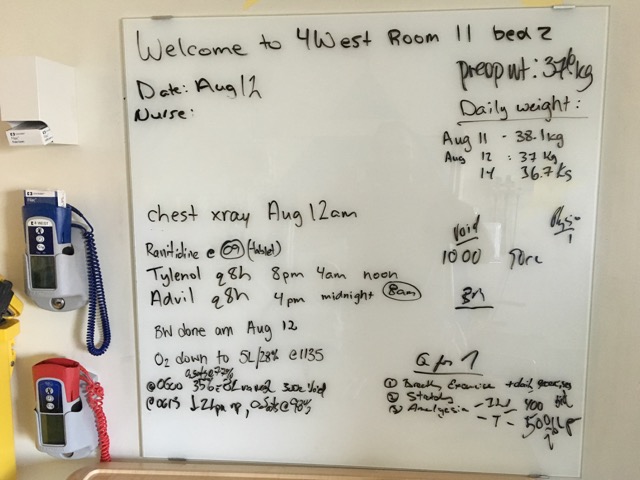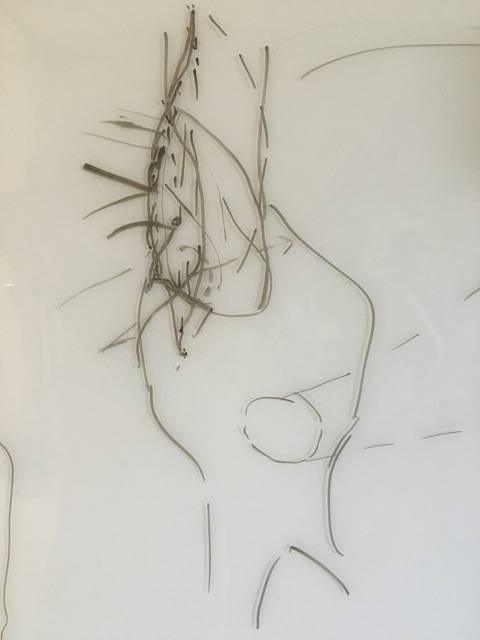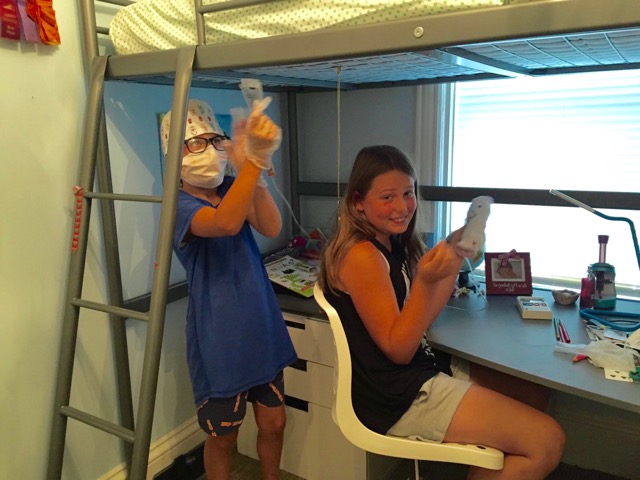
“Self-care is not selfish. You cannot serve from an empty vessel.”
-Eleanor Brownn
Recently our son spent five nights at the Children’s Hospital of Eastern Ontario following a very successful heart operation. Despite a bounty of overnight medical staff, I refused to sleep at home until it was certain that he was in the clear. Luckily I had the support to be able to do this — thank you grandparents — and my husband was able to switch spots with me later in the week.
If you are reading this article, chances are you will likely be required to help care for someone in the hospital at some point. New babies, elderly relatives, or sickness and operations provide ample opportunities to curl up in a sleek pleather chair at the bedside of your child, spouse, friend or relative. Hospitals do their best, but observation has taught me that most patients still need or want the comfort of a close bond while they are staying overnight.
Even if your emotional baseline is rock solid, the jeopardized health of a loved one automatically creates a start position of vulnerability. When unforeseen complications arise combined with a lack of sleep and the expectation of strength, burnout can quickly occur.
It is easy to assume, when one is not the patient, that it will take zero planning to have a successful hospital stay. However, much like commencing any big job, a plan and the right equipment can make a big difference.
During our stay, I realized that there were some common essentials that made it much easier to go the distance and thought this list was definitely worth sharing.
“Put on your own oxygen mask before assisting others.”
Pack very comfortable clothing that can double as pajamas. One morning I was awoken early by a nurse asking, “Ready to go to with us to x-ray?” Due to my well-chosen ensemble I was able to fling off my blanket and announce, “Well as a matter of fact, I am!” Choose cropped pants or pairs with elastic cuffs to avoid any part of your pant leg sweeping the floor. Layers are ideal, as temperature fluctuations seem to be regular. If you are packing night to night, always include an extra emergency set. I also recommend putting on each outfit in front of the mirror and bending deeply in several different directions to see what falls out. There is no joy in having to hold onto your top or mooning the nursing station when helping out with your charge.
Well-chosen footwear is key. It is necessary to bring quiet-soled shoes that can be slipped on and off quickly. Nothing will get you the death stare of other parents faster than the rhythmic slap of flip-flops. Closed toes and a wipeable surface are also beneficial features. There is no easy way to forget the feeling of warm, patient-generated fluid oozing between your toes.
Hospital air is shockingly dry. I assume this is to prevent bad things from growing and multiplying, which is fantastic, but the resulting aridness can leave a healthy human feeling quite parched. In addition to your required toiletries, I highly suggest packing lotion, lip balm, and some sort of hydrating eye drops. Baby wipes are a must as there always seems to be an opportunity to wipe something… I also recommend including tweezers as the florescent bathroom lighting is fabulous for plucking. Just make sure you aren’t too anxious or the shaping can get a little out of hand. Never trim your bangs.
Quick and irregular mealtimes combined with stress, too much coffee, and irregular sleep can cause the digestive system to wildly rebel. Alternatively, a lack of privacy and fibre may cause things to go the other way. Like you don't know what I am talking about… Taking the time to eat and including fruit and vegetables with every meal will curtail the potential for some deep gurgling discomfort.
The fastest way to feel terrible at the hospital, like having a hangover without the fun, is to become dehydrated. Bring your own water bottle and refill it regularly. Staying hydrated is so important and luckily every floor seems to have free cold water and ice machines at the ready.
Light reading materials, such as magazines with lots of pictures, really help to pass the time. Electronic devices with headphones are also ideal for listening to music or watching shows late at night.
A small household fan is nice for air movement, sound and even soothing a fever. Make sure to pack a notebook, pens, and a bag with a zippered top. A headlamp or book light is great for reading or navigating in a darkened room.
Nothing is scarier than what you think you know or heard. One night in hospital my son’s oxygen saturation level kept dropping while his nurse and I looked on unhappily for over an hour. As the minutes passed, my head filled with images of a crash cart squealing down the hallway with a cast member from Grey’s Anatomy kneeling astride on the stretcher. I later asked our nurse what would have happened if his levels hadn’t stabilized and the answer was, “Oh, we would have just put him on a different type of oxygen.”
Note to self: when you don't know what is happening, ASK. It is also helpful to take notes, write down questions in advance, and study the names of those treating your patient. Whiteboards, usually hanging in each room, are perfect for visual learners like me.


The words, “Excuse me please,” "I don't mean to interrupt but…” and, “Would you mind…?” can get you very far. Nurses and staff know where treasures like fitted sheets, extra chairs and pillows are kept and have tricks for solving all kinds of discomfort. When I asked one amazing nurse named Lorna if I could please have an extra blanket she replied, “Sure! I will get one for you FROM THE WARMER!” I also learned that you and your patient can get a better night’s sleep by asking to turn off the lights and close the door. Staff can sometimes even adjust monitors so that they only beep at the station in the hallway.
When someone you love is staying in hospital, one can easily perceive it curative to spend every moment holding his or her hand. When I told my father-in-law, a retired general surgeon, of my planned weeklong vigil, he kindly but firmly suggested that I would require a few stretches of proper home-style sleep or risk completely falling to pieces. Turns out that his 30 years of watching families interact following surgery were correct.
Lack of sleep and stress can do some really funny things to your brain. Even if you are able to doze throughout the night, constant necessary interruptions by staff prevent the deep sleep needed to keep you sane. I thought I was above this science until I passed a woman on the stairwell who smiled knowingly at me even though I had never seen her before. I later realized that I had interacted with her only a few hours earlier as she removed the breathing tube from my son’s throat.
If all is going well, leaving the hospital for a hot shower and good nap will improve your mental state and stamina dramatically. Going home is also a great opportunity to give some cuddles and attention to other children in the family who are undoubtedly missing you. Although visiting the hospital can be reassuring for kids, it can also be emotional, frightening and leave them full of questions. Check in with those taking care of your offspring to make sure they aren’t acting out their fears in your absence.

![]() RELATED: Everything Moms-To-Be Need To Bring To The Hospital
RELATED: Everything Moms-To-Be Need To Bring To The Hospital